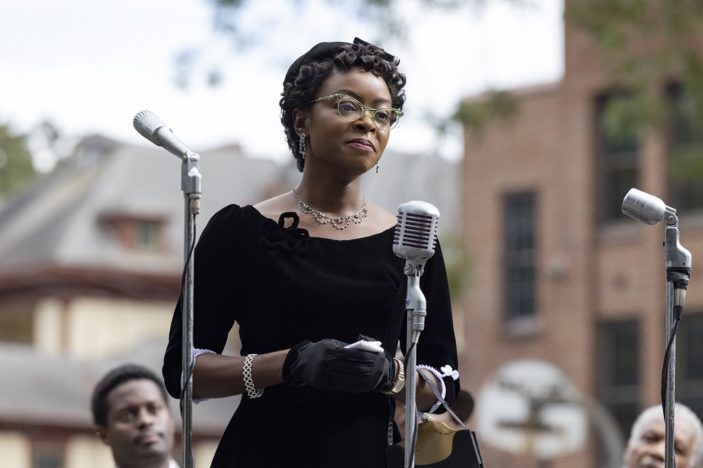
The murder of Emmett Till in 1955, Mississippi, still stands as one of America’s most shocking (and shameful) moments, even now almost 7 decades later. If you’re unaware – like myself going into this stirring drama – the 14-year-old Till (Jalyn Hall) was visiting family in Mississippi, the first time he had ever really been away from his loving, protective mother, Mamie (Danielle Deadwyler, in a grand, gut-wrenching performance that calls into question some of the nominations at the year’s Academy Awards for Best Actress), and, off perceived offence by a local white woman (Haley Bennett excelling as a truly infuriating, hateful character), was lynched as a result of his inexperience in navigating the white culture there.
His disfigured remains – a sequence in the film that shocks, but is never presented in a gratuitous fashion – became something of a symbol for the Civil Rights movement, as people of colour across the United States identified with the pictures that were released of his bruised body, sparking a call to action, but sadly only minimal change at the time; the film ends with statistics pertaining to the trial that followed and the lack of consequences for the white men who actually confessed to their crime and lived a life free from incarceration.
As easy as it could’ve been for writer/director Chinonye Chukwu (who co-wrote the script with Michael Reilly and Keith Beauchamp) to focus more on the murder of Emmett and, perhaps, guilt white audiences into submission with the type of barbarity the crimes centred on here are committed with, she takes the graceful, higher road, making Till a human story, centring on the poised Mamie and her dignified journey to fight racism and seek justice in a country that has failed her and her race time and time again.
Chukwu’s directorial prowess and Deadwyler’s emotional performance are the two main components that keep Till as engaging as it is. Not that we ever doubt it will drop our interest, but in Chukwu’s sensitivity it allows us to be wholly encapsulated by Mamie’s grief and determination. The film is less sensitive when it comes to depicting racism – nor should it practice as such – and the sheer infuriation brought forth by the narrative’s actions is exactly what should be experienced. Even if there’s stereotypes aplenty within the trial scenes – white Americans are just not it – it all comes from a place of truth; especially when the final title scrawl alludes to the length of time it took for Emmett’s death to be acknowledged in a lawful manner.
Opening in a week that has a slew of attractively budgeted studio efforts, a killer sequel, and another small, award-circle drama that actually earned Oscar prominence, Till may unfortunately be lost in the shuffle, but with the most important narrative at hand, it deserves audience respect. It may not be an easy watch, but it’s essential; and, if nothing else, Deadwyler’s performance will floor you to where the story’s personal relevance won’t be of issue.
![]()
![]()
![]()
![]()
![]()
FOUR STARS (OUT OF FIVE)
Till is now screening in Australian theatres.
